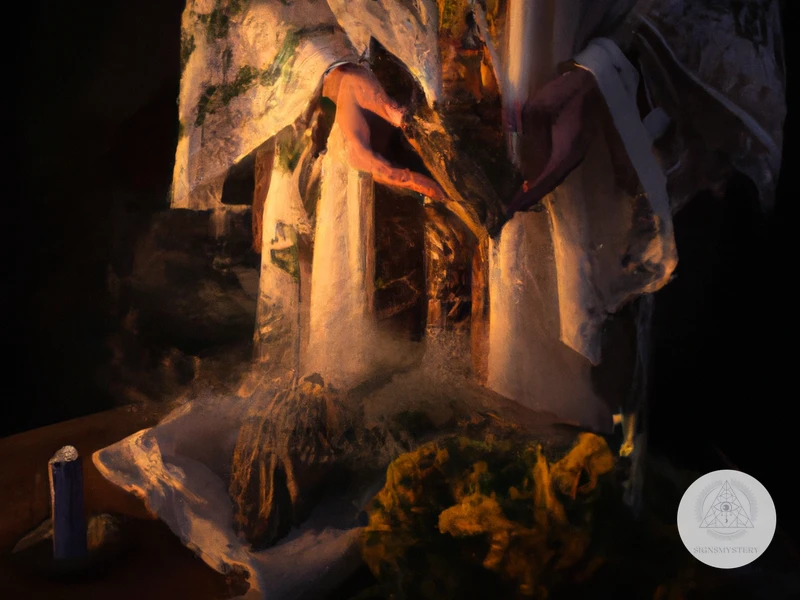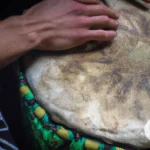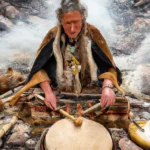Connecting with our ancestors is a practice deeply ingrained in shamanic traditions. In today’s rapidly changing world, many of us feel disconnected from our roots, unsure of our place in the world and our connection to the past. Engaging with ancestral connections in shamanism can offer a sense of grounding, belonging, and direction. In this article, we will explore the significance of ancestral connections in shamanism and discuss various methods for connecting with our ancestors. By discovering our ancestral lineage and connecting with our ancestors, we can experience healing, guidance, and a deeper understanding of ourselves and our place in the world.
Ancestral Connections in Shamanism

Ancestral connections are an important aspect of shamanism, as they allow individuals to tap into the wisdom and guidance of their ancestors for healing, transformation, and understanding. Through ancestral altars and offerings, meditation and journeying, and dreams and signs, individuals can connect with their ancestors and receive their guidance and support. Tracing ancestral lineage and working with ancestors across cultures can also provide a deeper appreciation for one’s roots and an understanding of the interconnectedness of all things. By honoring and cultivating ancestral connections, individuals can strengthen their spiritual practices and gain resilience and strength in their daily lives. For more information on ancestral communication in indigenous cultures, see here.
What are Ancestral Connections?
Ancestral connections are the ties that individuals have with their ancestors. It is a belief that one’s forefathers, including one’s grandparents, great-grandparents, and so on, have a significant influence on their lives. In Shamanism, ancestral connections are considered a vital part of spiritual practice. Connecting with one’s ancestors is seen as a way to invoke the guidance, wisdom, and support of those who came before us. The belief is that these connections help to heal ancestral trauma, address past wounds, and bring greater understanding and identity. In Shamanism, we understand that the energy of our ancestors flows through us, and it is important to honor this connection and maintain a positive relationship with them. Thus, Ancestral connections are integral to Shamanism and its practices.
To better understand these connections, you can explore the concept of “ancestor trauma” which can impact present day individuals and their kin. This can be remedied through strengthening ancestral connections and Shamanic journeys. In such journeys, Shamanic practitioners can connect with the spiritual realm and receive guidance and aid from their ancestors. This allows for the healing of ancestral wounds to take place. By delving into ancestral practices, one may also draw on ancestral wisdom and understand the traditions of their forefathers. It is important to note that connections with ancestors differ across cultures, and one must take the time to learn and respect various ancestral practices.
Ancestral connections are an important part of Shamanic practice that allow for individuals to derive a sense of guidance, support, and healing. Shamanism provides various ways in which individuals can connect with their ancestors, such as through honoring them on an ancestral altar, meditation and journeying, and paying attention to ancestral signs in dreams and during daily life. By establishing positive ancestral connections, individuals can gain greater resilience and strength, along with a deeper understanding of their identity and cultural heritage.
Why are Ancestral Connections Significant in Shamanism?
Ancestral connections play a vital role in shamanism. According to shamanic belief, the spirits of our ancestors are always with us and can provide guidance, healing, and support when we ask for it. These spirits have knowledge and wisdom that have been accumulated over generations, making them valuable sources of spiritual wisdom.
Connecting with our ancestors helps us to understand our place in the world and gives us a sense of grounding and belonging. In shamanism, it is believed that the connection with our ancestors is a critical part of our spiritual growth and development. When we can access the knowledge and wisdom of our ancestors, we can make better decisions and gain a sense of clarity in our lives.
Ancestral connections are essential in shamanic healing. By connecting with our ancestors, we can begin to heal the wounds of the past that have been carried down through generations. These wounds may include experiences of trauma, oppression, and other challenges that our ancestors faced. By healing these wounds, we can access the strength, resilience, and wisdom of our ancestors, which can be used to heal ourselves and others.
Honoring our ancestors is a way of recognizing the struggles they faced and acknowledging the strength they possessed. When we connect with our ancestors, we are showing deep respect for those who came before us and who paved the way for our existence. In turn, we become vessels for their wisdom and their legacies.
Ultimately, ancestral connections play a vital role in shamanism by providing us with a sense of belonging, offering opportunities for healing and growth, and connecting us to the wisdom and strength of our ancestors. To learn more about strengthening your ancestral connection, consider taking a shamanic journey or exploring the different ways to honor your ancestors in shamanic practice.
The Role of Ancestors in Shamanic Practice
Ancestors hold a significant role in shamanic practice, serving as guides, protectors, and sources of wisdom and knowledge. In many shamanic traditions, ancestors are believed to have a continued existence after death and are honored and revered as a powerful source of spiritual support for the living. The following are some of the key roles of ancestors in shamanic practice:
| Role | Description |
| Guide | Ancestors serve as guides in shamanic journeys, providing assistance, protection and guidance to the living. They can offer insights on personal issues, give warnings and advice on important decisions. |
| Protector | Ancestors can also act as protectors, guarding their lineage from spiritual harm and negative influences. They can provide a shield of psychic protection to their descendants, shielding them from negative energy, and helping them to navigate challenges in life. |
| Wisdom Keeper | Ancestors are seen as repositories of knowledge and wisdom. Through establishing a connection with ancestors, individuals can gain access to insights and knowledge needed for healing, spiritual growth, and personal development. |
| Healer | Ancestors who were healers or had knowledge of medicinal plants may offer guidance and healing to those who seek it. |
To connect with ancestors, a shaman may use various techniques such as meditation, shamanic journeying, and rituals. The methods used for creating a connection may vary depending on cultural beliefs, lineage, and individual preference. Proper preparation and respect are necessary to establish and maintain a meaningful and productive connection with ancestors.
Shamanic practice recognizes that ancestral spirits may be troubled, lingering, and stuck in the physical world due to unresolved matters or past traumas. The next section explores the ways one can work with Ancestor Trauma in shamanism.
How to Connect with Ancestors in Shamanism
Connecting with Ancestors in Shamanism is an essential part of shamanic practice. It allows individuals to tap into the wisdom, guidance, and support of their ancestors, as well as to heal ancestral wounds and gain a deeper understanding of their ancestral lineage.
There are several ways to connect with ancestors in shamanism. Some of them are:
| Through Ancestral Altars and Offerings | Creating an ancestral altar can be a powerful way to connect with ancestors. It is a sacred space where individuals can leave offerings such as food, flowers, or candles to honor and connect with their ancestors. |
| Through Meditation and Journeying | Meditation and journeying can also be used to connect with ancestors. By entering a meditative state, individuals can journey to the spirit world where they can communicate with their ancestors and receive guidance and support. |
| Through Dreams and Signs | Ancestors often communicate with individuals through dreams and signs. Keeping a dream journal and paying attention to signs in the physical world can help individuals connect with their ancestors and receive messages from them. |
By incorporating these practices into their shamanic work, individuals can strengthen their connection with their ancestors and gain access to the wisdom, guidance, and support they offer.
To learn more about strengthening ancestral connections through shamanic journeying, check out our article on strengthening ancestral connection through shamanic journeying.
Healing ancestral wounds through shamanism is also an important part of connecting with ancestors. To learn more about this topic, visit our article on healing ancestral wounds in shamanism.
For more information on connecting with ancestral wisdom in shamanic healing, check out our article on the topic.
Lastly, to learn about honoring ancestors in shamanism, visit our article on the subject. It is important to approach ancestral work with cultural sensitivity and respect, as discussed in our article on shamanic heritage and lineage.
Through Ancestral Altars and Offerings
Ancestral altars are an important tool for connecting with ancestors in shamanism. These altars serve as a physical space for honoring ancestors and creating a connection with them. Ancestral altars can be as elaborate or simple as you like, but they should be set up in a quiet and respectful area.
To create an ancestral altar, start with a clean surface such as a table or shelf. Place items that you associate with your ancestors, such as photographs or heirlooms, on the altar. You can also include items that represent the elements, such as stones or water. Remember to use items that have personal significance to you and your ancestors.
Offerings are an important part of ancestral altars. The act of giving an offering to your ancestors is a way of showing respect and gratitude. Offerings can vary depending on your cultural background and personal beliefs. Some popular offerings include food, candles, and incense.
To make an offering, simply place it on the altar and speak a prayer or message to your ancestors. You can also leave offerings at other places that hold significance for your ancestors, such as a grave or a place where they lived.
Creating an ancestral altar and giving offerings can be a powerful way to connect with your ancestors and receive their guidance and support. Remember to approach this practice with respect and intention, and to honor your ancestors in a way that feels authentic to you.
If you want to learn more about the significance of ancestral wisdom in shamanism, check out our article on Ancestral Wisdom in Shamanic Healing or explore more about honoring ancestors in shamanism in the article Honoring Ancestors in Shamanism.
Through Meditation and Journeying
Meditation and journeying are powerful methods for connecting with our ancestors in shamanism.
Meditation:
| Step 1:
Select a quiet and comfortable space |
Choose a peaceful and serene space where you will not be disturbed or interrupted. It could be indoors or outdoors, as long as you feel safe and secure in the space. |
| Step 2:
Set an intention |
Set a clear intention to connect with your ancestors, and ask for their guidance and wisdom. |
| Step 3:
Breathing exercises |
Take a few deep breaths to calm your mind and body. You can use techniques such as deep belly breathing or counting your breaths to help you focus. |
| Step 4:
Mentally connect with your ancestors |
Visualize a connection between yourself and your ancestors. You can imagine a beam of light or a bridge connecting you to them. |
| Step 5:
Receive messages |
Be open to receiving messages from your ancestors. They may come in the form of images, sensations, or words. Trust your intuition and allow yourself to surrender to the experience. |
Journeying:
| Step 1:
Prepare yourself |
Find a comfortable position where you can relax and be undisturbed. Set your intention to connect with your ancestors. |
| Step 2:
Create a safe space |
Visualize a protected space around yourself, such as a bubble of light, to ensure that you are safe and secure during your journey. |
| Step 3:
Enter a trance state |
Enter into a light trance state by focusing on your breathing or a repetitive sound, such as a drumbeat or rattle. |
| Step 4:
Meet your ancestors |
Visualize yourself traveling to a sacred space where you can meet and communicate with your ancestors. Trust your intuition and allow your imagination to guide you. |
| Step 5:
Receive messages |
Be open to receiving messages from your ancestors. They may appear as animals, symbols, or people. Trust your intuition and allow yourself to surrender to the experience. |
In both meditation and journeying, it is important to trust your intuition and allow yourself to surrender to the experience. By connecting with our ancestors, we can gain wisdom, guidance, and support from the spirits who came before us.
Through Dreams and Signs
Through dreams and signs, connecting with ancestors in shamanism can become a reality. Dreams are considered the realm of the soul and are believed to be a direct communication channel between the physical world and the spirit world. The following are ways to connect with ancestors through dreams and signs:
| Technique | Description |
|---|---|
| Keeping a Dream Journal | Keeping a dream journal is important for recording the messages from the ancestors. Throughout the day, set an intention to remember your dreams and record them immediately upon waking up. Reviewing the journal regularly might reveal patterns or symbols. |
| Interpreting Dreams and Signs | Dreams and signs can have several meanings and interpretations. Learning about the symbolism of the culture of ancestors will help interpret their messages correctly. Symbols may include water, animals, numbers, and colors. |
| Invoking Ancestors in Dreams | Before going to sleep, set an intention to invoke ancestral spirits in dreams. You can call upon them to reveal their presence and messages of wisdom, healing or guidance. It is advisable to perform this after a cleansing ritual. |
Signs could be a direct way that ancestors make their presence known. Be open and aware of the environment while also keeping an open mind to anything that seems like a coincidence. These may include finding feathers, animals showing up in unusual places, or even repeating numbers.
Through dreams and signs, connecting with ancestors in shamanism can prove to be insightful and transformative. Consider giving emphasis to developing this aspect of ancestral connection for a deeper spiritual experience.
Exploring Ancestral Lineage
Exploring ancestral lineage is a powerful way to connect with our past and gain a deeper understanding of who we are. One way to trace our ancestry is through genealogy research, which involves investigating historical records and documents to uncover information about our ancestors. Another way to explore ancestral lineage is through cultural traditions and practices. For example, in some cultures, the passing down of family stories and legends is an important way of connecting with past generations. It is important to approach this exploration with respect and sensitivity, recognizing the diversity and complexity of ancestral lineages. By understanding our ancestral roots, we can gain a greater sense of identity and purpose, as well as uncover valuable insights that can help guide our lives.
How to Trace Your Ancestral Lineage
Tracing your ancestral lineage can be a complex and rewarding journey. Here are some steps to help you get started:
1. Start with what you know – Begin by mapping out your family tree starting with your parents, grandparents, and great-grandparents. Record birth and death dates, locations, and any other relevant information.
2. Ask questions – Reach out to relatives and ask about their memories, stories, and any documents or photographs they may have. Be open to learning about family members you may not have been aware of.
3. Search records – Look for birth, marriage, and death records, census data, immigration and naturalization records, military records, and other public documents. This can be done through online databases and archives, as well as in-person visits to libraries and historical societies.
4. Hire a professional – If you are struggling to find information or have hit a dead end, consider hiring a professional genealogist to help you with your research.
5. Consider DNA testing – DNA testing can provide valuable information about your ancestry, including ethnic origins and potential relatives. Be sure to research different companies and their policies before choosing a test.
Remember, tracing your ancestral lineage is a unique and personal journey. Stay open-minded and curious, and be prepared to discover unexpected connections and new perspectives on your family history.
Working with Ancestors Across Cultures
When working with ancestors in shamanism, it is important to have an understanding of and respect for different cultural practices and protocols. Ancestral connections are not exclusive to one culture or lineage, and it is possible to work with ancestors from different cultural backgrounds.
Respecting different ancestral practices and protocols is crucial in order to avoid cultural appropriation, which can be harmful and disrespectful. It is important to approach different ancestral traditions with an open mind and a willingness to learn and understand their significance.
Learning from different ancestor traditions can provide valuable insights and perspectives, as well as deepen our understanding of our own ancestral lineage. A shamanic practitioner can integrate practices and beliefs from different ancestral traditions into their own practice, as long as they approach it with respect and sensitivity.
Maintaining cultural sensitivity is key when working with ancestors across cultures. It is important to avoid generalizing or stereotyping different cultures or making assumptions about their beliefs and practices. Instead, it is important to approach each culture with an open mind, a willingness to learn, and an attitude of respect and reverence.
Working with ancestors across cultures can be a powerful and transformative experience in shamanism. By respecting different ancestral practices and protocols, learning from diverse traditions, and maintaining cultural sensitivity, a shamanic practitioner can deepen their understanding and connection to their ancestors and the spiritual realm.
Respecting Different Ancestral Practices and Protocols
Respecting Different Ancestral Practices and Protocols is central to developing a deeper connection with your ancestors. This involves learning about and honoring the unique practices and traditions of your ancestors’ culture. It’s essential to keep in mind that ancestral practices differ from one culture to another, and some are highly sacred and secretive. Here are some ways in which you can respect different ancestral practices and protocols:
- Research and Educate Yourself: It’s crucial to take the time to research the cultural practices of your ancestors and the protocols surrounding their practices. This involves learning about the history, beliefs, and values of their culture, which can offer insight into their way of life and worldview. By educating yourself, you can develop a greater appreciation of their practices and the meaning behind them.
- Seek Permission: When working with ancestral practices from a culture that’s not your own, it’s essential to seek permission from an elder or other knowledgeable member of that community. This can involve making offerings to ask for their guidance and blessing or simply asking for their permission to learn about their practices. It’s important to show respect for their beliefs and not assume that you have the right to participate in their sacred rituals.
- Follow Cultural Guidelines: Every culture has specific protocols and guidelines surrounding their ancestral practices. It’s crucial to follow these guidelines to show respect for their traditions. This may involve dressing in a specific way, using specific offerings, or performing certain rituals in a specific order.
- Be Sensitive to Cultural Appropriation: It’s essential to be aware of cultural appropriation and ensure that you’re not borrowing elements from another culture in a disrespectful or inappropriate way. Cultural appropriation involves taking elements of another culture without proper understanding or appreciation of their meaning and significance.
- Work with Respect and Reverence: When connecting with your ancestors, it’s essential to approach the practice with respect, humility, and reverence. This involves creating a sacred space that’s dedicated to their memory and following the protocolsand guidelines associated with their ancestral practices. It’s important to remember that you’re working with beings that have passed on, and holding them in high regard is key in developing a deep and meaningful connection.
Subscribe to Our Newsletter
Sign up to receive the latest news and updates.
By respecting different ancestral practices and protocols, you can create a lasting connection with your ancestors and honor their memory in a meaningful way. Through learning about their practices and performing them with respect and reverence, you can deepen your understanding of your heritage and cultural identity.
Learning from Different Ancestor Traditions
Learning from Different Ancestor Traditions involves gaining knowledge and wisdom from the ways that different cultures connect with their ancestors. It is essential to approach these ancestral traditions with respect and openness, understanding that other cultures may have different practices and beliefs around their ancestors. By exploring these different traditions, we can expand our understanding of the vast network of ancestral wisdom that exists around the world.
Here are some ways to learn from different ancestor traditions:
- Research and Study: Learning about different cultural practices and beliefs is a good place to start. Libraries, museums, and online resources can provide a wealth of information about ancestral traditions and practices.
- Connect with Cultural Elders: Seeking out and connecting with elders in different cultural communities can provide a deeper understanding and appreciation of ancestral traditions. These elders are often willing to share their knowledge and experiences with those who show respect and genuine interest.
- Attend Cultural Events: Participating in cultural events such as ceremonies, festivals, and workshops can be a great way to experience ancestral traditions and connect with the community that practices them.
It’s essential to keep in mind that when we learn from different ancestor traditions, it’s crucial to respect the cultural protocols and practices that may be different from our own. We can learn a lot from other cultures, but we must approach them with humility and an open mind. By doing so, we can expand our understanding of how different cultures connect with their ancestors and how we can incorporate these practices into our own spiritual practice.
Maintaining Cultural Sensitivity
Maintaining cultural sensitivity is crucial when working with ancestors from different cultures. It is important to understand and respect the practices and protocols of different ancestral traditions. By doing so, we honor our ancestors’ legacy and ensure that we are not appropriating their culture.
Here are some tips on how to maintain cultural sensitivity when connecting with ancestors from different cultures:
1. Educate Yourself: Research the culture and the history behind the practices of the ancestors you are trying to connect with. Read books and articles, watch documentaries, and speak to cultural experts. This will not only help you understand their practices, but also give you a deeper appreciation and respect for their traditions.
2. Seek Permission: In some cultures, it may be considered disrespectful to connect with ancestors without permission. Seek guidance from the elders or spiritual leaders in that culture and ask for their permission before engaging in any ancestral work.
3. Respect Boundaries: Each ancestral tradition has its own boundaries and rules. Respect these boundaries and avoid appropriating their culture. For example, do not use sacred symbols or artifacts from a culture that you are not a part of.
4. Follow Protocols: Different ancestral traditions have their own protocols for connecting with ancestors. Follow these protocols to show respect for their traditions, and to ensure that you are connecting with them in a safe and respectful manner.
5. Avoid Stereotyping: Do not fall into the trap of stereotyping cultures or people. Each culture is diverse and complex, and it is important to recognize and respect this diversity.
By maintaining cultural sensitivity, we can form meaningful connections with our ancestors from different cultures in a respectful and authentic manner.
Benefits of Developing Ancestral Connections
Developing ancestral connections can have numerous benefits for individuals practicing shamanism. Connecting with ancestors can bring about profound healing and transformation by addressing unconscious patterns and traumas that may have been passed down through generations. Ancestral connections can also provide guidance and support during difficult times, as ancestors can offer wisdom and insight from their experiences. Developing ancestral connections can contribute to a sense of strength and resilience, as individuals feel a deeper connection to their roots and ancestral lineage. Finally, ancestral connections can offer a greater sense of understanding and identity, as individuals explore their family history, cultural heritage, and spiritual traditions. By developing ancestral connections, individuals can experience a powerful transformation that can positively impact their lives and the lives of those around them.
Healing and Transformation
Connecting with our ancestors in shamanism can bring about deep healing and transformational experiences. By acknowledging and honoring our ancestral lineage, we can address and heal past traumas, wounds, and negative patterns that have been passed down through generations.
One way to use shamanic practices to facilitate healing and transformation is to create an ancestral altar or shrine. This is a space set aside specifically for connecting with ancestors and making offerings to them. It can be adorned with sacred objects, candles, and photographs of ancestors. By sitting in front of the altar and making offerings, we invite the presence and guidance of our ancestors.
Meditation and journeying are also powerful tools for connecting with our ancestors. By entering into a trance-like state, we can communicate with our ancestors and receive their guidance and wisdom. This can help us to gain a deeper understanding of ourselves and our place in the world, as well as to receive insights into any challenges we may be facing in our lives.
Working with our ancestors can also allow us to break free from negative patterns and behaviors that we may have inherited. By acknowledging and confronting these patterns through ancestral work, we can begin to heal and transform them, allowing us to live more fulfilling and authentic lives.
Developing a connection with our ancestors through shamanic practices can bring about profound healing and transformational experiences that can positively impact every aspect of our lives. So, it is important to honor and respect the practice, as well as trust the journey.
Guidance and Support
Connecting with ancestors in shamanism can offer guidance and support in various areas of life. Ancestors are believed to have a wealth of knowledge and experiences from their time on Earth, which they can share with their descendants in the present. Here are some ways ancestral connections can offer guidance and support:
| Decision-making | Ancestors can offer guidance when it comes to making important decisions in life. They may have experienced similar situations and can provide insights and wisdom to help their descendants make the right choices. |
| Personal Growth | Ancestors can also provide support and guidance for personal growth and development. They may have gone through similar struggles and challenges and can offer advice and encouragement to help their descendants overcome obstacles and reach their full potential. |
| Relationships | Ancestors can offer guidance and support when it comes to relationships with others. They may have insights on how to establish healthy relationships or how to heal strained ones. They can also provide comfort and nurturing for those dealing with heartbreak or loss. |
| Connecting with Higher Powers | Ancestors can serve as a bridge between the living and the spiritual realms. They can offer guidance on connecting with higher powers such as deities, angels, or spirit guides. They can also offer protection and assistance in spiritual practices. |
In order to receive guidance and support from ancestors, it is important to cultivate a relationship with them through consistent communication and offerings. Ancestors appreciate offerings such as food, drink, and other items that were meaningful to them in life. By honoring and remembering their legacy, we can receive their continued guidance and support in our lives.
Strength and Resilience
Strength and resilience are two important qualities that can be gained through the development of ancestral connections in shamanism. Ancestral connections can provide a sense of grounding and stability that can help individuals navigate difficult situations and cope with adversity.
One way to develop strength and resilience through ancestral connections is by connecting with ancestors who have overcome great challenges in their own lives. By learning about their struggles and triumphs, we can gain inspiration and guidance for our own lives. For example, if we have ancestors who survived war or famine, we can draw strength from their resilience in the face of adversity.
Another way to develop strength and resilience is by connecting with ancestors who possess qualities that we admire and wish to cultivate in ourselves. For example, if we have ancestors who were known for their courage, we can call upon their spirit to help us find the courage we need to face our own challenges.
Developing ancestral connections can provide a sense of belonging and connection to something larger than ourselves. This can help us feel more rooted and connected in our own lives, which can in turn provide a sense of strength and resilience. By knowing that we are part of a larger lineage and tradition, we can feel more supported in our journey through life.
Developing ancestral connections can provide a powerful source of strength and resilience for individuals working to navigate the challenges of life. Through connecting with ancestors who have overcome challenges, cultivating qualities we admire, and developing a sense of belonging and connection, we can find the inner resources we need to weather difficult times and come out stronger on the other side.
Understanding and Identity
Developing a relationship with our ancestors through shamanic practices can help us gain a deeper understanding of who we are and where we come from. By connecting with our lineage, we can gain insight into our family’s strengths, talents, and challenges. We can also better understand the historical and cultural contexts that have shaped our ancestral heritage.
Through this understanding, we can develop a stronger identity and sense of purpose in our lives. By recognizing the wisdom and knowledge of our ancestors, we can draw upon their experiences to better navigate our own paths. This can be particularly empowering for individuals who have experienced a lack of connection or belonging in their lives, as it provides a sense of continuity and history.
Developing a deeper understanding of our ancestors can also increase our appreciation for diversity and cultural differences. By recognizing and honoring the unique practices and traditions of our ancestors, we can also gain a greater respect for the diversity and richness of human experience.
Developing ancestral connections can be a powerful tool for promoting personal growth, self-awareness, and cultural sensitivity. By tapping into the wisdom and guidance of our ancestors, we can better navigate the challenges and opportunities of our own lives, while also honoring and preserving the legacies of those who came before us.
Conclusion
In conclusion, connecting with ancestors in shamanism can be a powerful and transformative experience. By honoring our ancestors, we can tap into a deep well of wisdom, guidance, and support. Through ancestral altars, meditation and journeying, dreams and signs, we can establish a profound connection with our ancestors, allowing us to access their teachings and insight.
Tracing our ancestral lineage can also be a rewarding experience, helping us to understand our roots and identity. By working respectfully with different ancestor traditions and maintaining cultural sensitivity, we can learn from diverse cultures and practices.
Developing ancestral connections can have many benefits, from healing and transformation to strength and resilience. It can also provide a sense of understanding and guidance, helping us to navigate life’s challenges with greater clarity and purpose.
If you are drawn to shamanism and ancestral connections, it is important to approach the practice with an open mind and heart, and to seek guidance from experienced and knowledgeable teachers. With patience, dedication, and respect, you can build a rich and meaningful relationship with your ancestors, and open the door to a wealth of spiritual understanding and growth.
Frequently Asked Questions
What is ancestral connection in shamanism?
Ancestral connection in shamanism is the practice of connecting with and honoring one’s ancestors or those who have passed on before us.
Why is ancestral connection significant in shamanism?
Ancestral connection is significant in shamanism because it allows us to tap into the wisdom and guidance of those who came before us, and learn from their experiences. It can also help us in our own healing and transformation.
What is the role of ancestors in shamanic practice?
Ancestors can play a variety of roles in shamanic practice, from providing guidance and healing to acting as protective spirits or spiritual allies.
How can I connect with my ancestors in shamanism?
You can connect with your ancestors in shamanism through practices like building an ancestral altar, meditation and journeying, and paying attention to dreams and signs that may come through from your ancestors.
What is an ancestral altar?
An ancestral altar is a sacred space that you create to honor and connect with your ancestors. It can include things like photos, candles, and offerings such as food or flowers.
How can meditation and journeying help me connect with my ancestors?
Through meditation and journeying, you can enter a trance state and connect with your ancestors on a deeper level. This can allow you to receive guidance, healing, or messages from your ancestors.
Why is it important to respect different ancestral practices and protocols?
It is important to respect different ancestral practices and protocols because every culture and tradition has their own unique way of honoring and connecting with their ancestors. Respecting these practices shows reverence and appreciation for their cultural heritage.
How can I trace my ancestral lineage?
You can trace your ancestral lineage through genealogy research, DNA testing, and talking to family members and elders who may have knowledge about your family’s history.
How can working with ancestors benefit me?
Working with ancestors can benefit you in many ways, such as providing guidance, support, and healing. It can also help you develop a deeper understanding of your own identity and place in the world.
Can I work with ancestors from cultures outside of my own?
Yes, you can work with ancestors from cultures outside of your own, as long as you approach it with sensitivity and respect for their cultural traditions and protocols.










